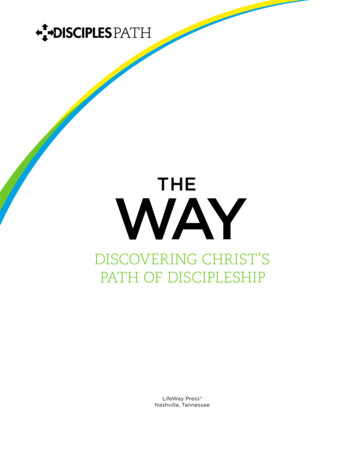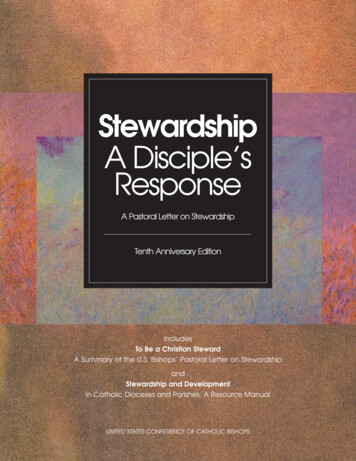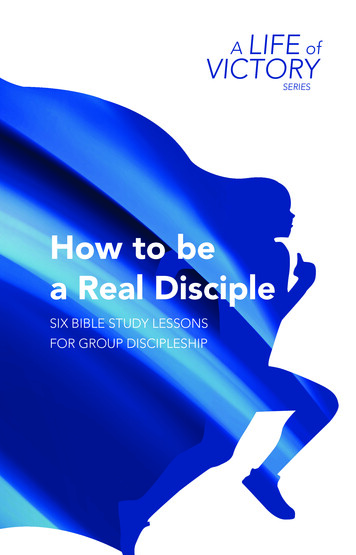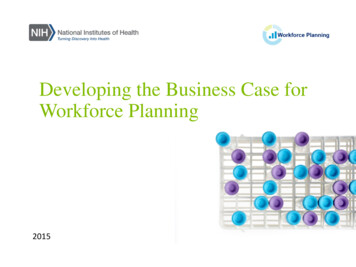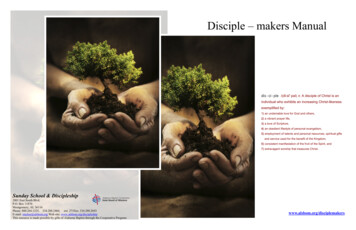
Transcription
Disciple – makers Manualdis·ci·ple /(dĭ-sī' pəl) n. A disciple of Christ is anindividual who exhibits an increasing Christ-likenessexemplified by:1) an undeniable love for God and others,2) a vibrant prayer life,3) a love of Scripture,4) an obedient lifestyle of personal evangelism,5) employment of talents and personal resources, spiritual giftsand service used for the benefit of the Kingdom,6) consistent manifestation of the fruit of the Spirit, and7) extravagant worship that treasures Christ.Sunday School & Discipleship2001 East South Blvd.P.O. Box 11870Montgomery, AL 36116Phone: 800.264.1225, 334.288.2460, ext. 271Fax: 334.288.2693E-mail: stucker@alsbom.org Web site: www.alsbom.org/discipleshipThis resource is made possible by gifts of Alabama Baptist through the Cooperative Program.www.alsbom.org/disciplemakers
OFFICE OF SUNDAY SCHOOL & DISCIPLESHIPDaniel Edmonds, DirectorExt. 285Email – dedmonds@alsbom.orgPastor, Staff and General Leaders Sunday SchoolBible Study Ministries and Small GroupsSunday School Health, Growth, and OutreachSonya Tucker, AssociateJamie Baldwin, AssociateExt. 271Email – stucker@alsbom.orgDiscipleship and Disciple-makingFollow-up and AssimilationAdult, Children, and Preschool DiscipleshipExt. 240Email – jbaldwin@alsbom.orgAdult Sunday SchoolYouth Sunday SchoolSunday School ConferencesEileen Mitchell, AssociateJames Blakeney, AssociateExt. 221Email – emitchell@alsbom.orgSingle AdultSenior AdultFamily MinistriesExt. 286Email – jblakeney@alsbom.orgChildren Sunday SchoolPreschool Sunday SchoolVacation Bible SchoolShari Holley, Ministry AssistantCharlotte Burgos, Ministry AssistantExt. 313Email – sholley@alsbom.orgSunday School and DiscipleshipExt. 307Email – cburgos@alsbom.orgSunday SchoolRamona Noah, Ministry AssistantJudy Burton, Ministry AssistantExt. 312Email – rnoah@alsbom.orgAdult and Youth Sunday SchoolExt. 255Email – jburton@alsbom.orgVacation Bible SchoolLidia Wolfe, Ministry AssistantBelinda Stroud, Bible Drill ConsultantExt. 246Email – lwolfe@alsbom.orgSunday School ResourcesEmail–4strouds@bellsouth.netMeadow Brook B.C.2916 Lake Highland WayBirmingham, AL 35242205-981-9881 hm205-531-3356 cellThis resource was created by the Church Health Team of the State Convention of North Carolina. It has beenre-edited and redesigned by permission and in cooperation with the Church Health Team
A Biblical Basis for DiscipleshipFour Disciple-making Phasesin the Life of JesusThe biblical framework overviewed herecomes from the life and disciple-makingmodel of Jesus. His spiritual leadership iscaptured in four biblical concepts andphrases that worked in His secular andpluralistic culture and are certain towork in ours. Each of these concepts canbe found in each of the gospels. Thiswidespread occurrence gives clearevidence of their value in the ministry ofJesus.Come and See (John 1:38-39)Jesus knew that in a pre-Christian andsecular world He would have to buildrelationships before anything else couldhappen. Consequently, the first phase ofHis ministry was usually meeting peopleon their turf in places where they werelikely more comfortable with theirenvironment than He was. He sought tofind language that would communicateto those He was with rather than usereligious language. While clear about Hisboundaries, He was all about buildingbridges rather than barriers. He wantedto attract their interest and build arelationship with them. He sought toinclude them in places where they couldbelong.Come and Follow Me(Mark 1:16-17)“By this my Father is glorified, thatyou bear much fruit and so prove to bemy disciples.”John 15:8Having attracted their interest andcuriosity, Jesus had fellowship withthem. At that point He was ready toengage them at their point of interest.Once a relationship was established,Jesus walked with people to the next level of their spiritual journey as He askedthem to “come follow me.” This phase isall about answering questions and responding to issues. He prayed for andworked toward divine appointments andteachable moments. When they asked,“Lord teach us to pray,” He capturedthat moment in their lives as a way ofleading them forward in faith.Responding to their questions and issueswas a way to lead them to develop spiritual life disciplines. Jesus alsomodeled for them spiritual leadership.His behaviors, actions, attitudes andrelationships were something Hisfollowers observed as they followed Himin all arenas of life on a daily basis.Come and Be with Me(Mark 3:13-14)Come be with me essentially becomes“come be me.” The follower becomes aleader of others and one who emulatesthe virtues, teachings, behavior andlifestyle of Christ. They can be like Christin these ways because they haveobserved and learned about these waysin previous ventures with Christ. Such anincarnation-type phase of life is theessence of the Good News. God came toearth in human form so others mightsee, walk with and experience Him in thedaily events of life. This phase ofleadership training is about deepening,integrating and personalizing thosebeliefs and skills to which they arecommitting themselves.
“Therefore, since we have been justifiedthrough faith, we have peace with Godthrough our Lord Jesus Christ, through whowe have gained access by faith into this gracein which we now stand. And we rejoice in thehope of the glory of God.”Romans 5:1-2“Bear one another’s burdens, andthereby fulfill the law of Christ.”Galatians 6:2Assessing/coaching questions in this resource were prepared by Eddie Hammett, author of Reframing SpiritualFormation: Discipleship in an Unchurched Culture and Spiritual Leadership in a Secular Age: Building BridgesInstead of Barriers and Reaching People Under 40 While Keeping People Over 60.
Discipleship Helps Available on Demand nloadable FreeDownloadableFree ResourcesResourcesGeneralResourcesNew MemberResources Spiritual Disciplines: Pathway to Christian Maturity(a resource of the Georgia Baptist Convention)SmallStrategyGroup Resources Developing a Church Based Discipleship(a resource of the Georgia Baptist Convention)AdministrativeWhereConventionto begin? of North Carolina) Discipleship Guidebook (a resourceHelpsof the–Baptist Download Free DiscipleshipResourcesAgeGroups here (LifeWay resource) Discover Your Spiritual Gifts (Definitions) (LifeWay resource) Spiritual Gifts Survey (LifeWay resource)Conferences/Consultations Visit LifeWayChristian Resources Discipleship pageDiscipleship – What are my options?Youth/StudentOverview of theDisciple-makers ResourcesManual and how it can be used DiscipleNow planning guide (a free resource from LifeWay)Where do we begin? Know. Own. Known. (a Lifeway resource)AssimilatingNewMembers Know. Own. Known.- The VitalSeries(a Lifeway resource)Reaching People Under 40 While Keeping People Over 60Preschooland ChildrenResourcesActivatingan ApatheticChurchAudiovisual Discipleship Options for Kids (a Lifeway ipleship andleadershiptrainingon loan from our Levels of BiblicalLearningresources(a Lifeway resource)1-800-264-1225 ext 231http://www.lifeway.com/article/167087 Levels of Bible Skills (a Lifeway resource)http://www.lifeway.com/article/167205 Children and Conversion (a resource of the Baptist Convention of North Carolina)media centerDiscipleship materials for a variety of language M%253D201214,00.htmlConferences/Consultations Great Beginnings for New ChristiansAssimilating New MembersDiscipleship—What are my Options?Discipleship—Where do we begin?Overview of the Disciple-Maker’s Manual and how it can be usedDiscipleship Pastor/Director WorkshopIntentional Discipleship for preschool, children, students and adultsFive Approaches to Disciple-Making in Your Church2011 Doctrine Study Clinic, Compelled by Love: A Journey to Missional LivingBible Drill and Speaker’s TournamentPartners with Parents to Disciple Their ChildrenAudiovisual discipleship and leadership training resources on loan from our media center1-800-264-1225 ext 231Discipleship materials for a variety of language M%253D201214,00.htmlLearning to represent His presence invarious phases and stages of life demandstime and patience on the part of allconcerned. Walking with Jesus andlearning what it is for Him to be Lord of allyour life is a life stage and life change thatcalls forth what we were created to be. Thisphase is about owning who He created usto be and living into our destiny and our fullpotential. Here is the place and experiencewhere we find and experience all theabundance life has to offer. This is not tosay it is perfection without struggle. In fact,it is only in the pain and struggle that manylessons are learned and the faithfulness ofChrist in those experiences is made clear.Come Abide in Me (John 15:4)Jesus declares the “field test” andapprenticeship over. He must physicallyleave, but He promises to leave His Spirit.Thus, we will then be able to do greaterthings than He has done because we havebeen with Him. The abiding relationshiphinges on prayer and learning to live intoand from the spiritual life disciplines thathave been taught and caught as theywalked with Christ. Abiding has anintentionality to it: being intentional aboutthe disciplines, fellowship with otherbelievers, reading and living lessons fromScripture, and being salt, light and leaven inthe church and as the church in the world.What a privilege! What a gift! What aresponsibility! What a challenge!Growing leaders means taking themfrom where they are and moving themforward to their full potential. Thistakes time, patience, energy,commitment, perseverance, faith,conviction, dedication and much prayer.Adapted from T-NET International materials by BillHull and Bob Gillam, cited in “Spiritual Leadership ina Secular Age” by Edward H. Hammett, 2006The following are Scriptures thatdescribe what a disciple of Christlooks like: Deuteronomy 10:12-21Micah 6:8Matthew 5:3-16Romans 5:1-5Romans 12:1-211 Corinthians 132 Corinthians 3:12-7:1Galatians 5:22-6:10Ephesians 4:20-6:201 Peter 1:1-3:162 Peter 1:2-102 Peter 1:4-81 John 4:7-21
Transform Hearts and Churches by Making DisciplesTransformed hearts is the fruit of discipleship and is thefocus of the Discipleship & Family Ministries staff of theAlabama State Board of Missions. The mandate of theGreat Commission is at the forefront of our prayer,planning and consulting, and training objectives. registration information.Join a learning community of peers in yourregion who are seeking to develop theirdiscipleship ministry.Encourage your pastor/staff to join thedisciple-making opportunities which offer special training and resources.Call and schedule an appointment or trainingsession with State Missionary, Sonya Tucker,Email stucker@alsbom.org,1-800-264-1225 ext. 271This manual provides inspiration, guidance, resources andan overview of five possible approaches to disciple-makingfor a local church. Discipleship is no longer just a Sundaynight program, but is carried out through a variety ofapproaches seven days a week. In fact, if you limitdiscipling to Sunday night or Wednesday nightprogramming you weaken and restrict the possibilities ofdisciple making in your church and community in a 21stcentury world.Making Preschool and Children’s Disciples Through (Use these pages to build your church strategy. Find samples at ientedProgram-orientedProcess-orientedAlabama Baptist pastors, lay leaders and churches arediscipling people through a wide variety of approaches todiscipleship. We believe there are five approaches bearingfruit in the ministry of disciple-making. Consider the basiccharacteristics of these five approaches. Whichapproach(es) are you utilizing the most as yourdisciple-making efforts? Which approach is bearing themost fruit? What other approach might be worthy ofexploring and implementing now?Person-orientedNow what are your next steps withthis guidebook?Consider * Products listed are also available for preschoolers. Inviting other church leaders and those with apassion for discipleship to review each of theapproaches with you.Evaluate which approach you are mosteffectively using now.What might be another approach you candevelop in the next six months?Who can be leaders in this approach? Who arethose making disciples who can multiplythemselves in other interested and readypersons?Participate in a conference offered byDiscipleship & Family Ministries to help answeryour questions, celebrate your victories andassist with your challenges. Visit the Web sitewww.alsbom.org/dfm for schedules andAnd Jesus came and said to them, "All authorityin heaven and on earth has been given to me. Gotherefore and MAKE DISCIPLES of all nations,baptizing them in the name of the Father and ofthe Son and of the Holy Spirit, teaching them toobserve all that I have commanded you. And behold, I am with you always, to the end of theage."Matthew 28:18-20“Be kind to one another, tender-hearted,forgiving each other, just as God inChrist also has forgiven you.”Ephesians 4:32Go to www.alsbom.org/bibledrills for more resources.Resourceswe recommendConferences /Consultationsavailable from the ALSBOM
Overview of theMaking Youth Disciples Through 5 Approaches to Making Disciples& Disciple–making Strategies For Your Church(Use these pages to build your church strategy. Find samples at www.alsbom.org/disciplemakers)ResourcesResources we available from the ALSBOMFinding and Taking Next Steps in DiscipleshipEach of the five approaches is valuable and can produce life-changing results for disciples.However, it is important to note that each approach has inherent strengths andweaknesses and each will produce different results in the life of disciples. Below is asummary of each approach.Program-orientedApproach 1.Audience:The worshippers of the church.Benefits:This approach will reach a wide section of members and attendees. Manybelievers are heavily influenced by the worship experience and by sermonsin particular. This approach allows the pastor to set the discipleship tone forthe church. This approach also models how to read and interpret the Biblefor life-change.Drawbacks:Requires little commitment from those being discipled. It is tough to followup with those being discipled or to measure life-change. Accountability isdifficult if not impossible. Only one discipleship issue can be addressed at atime, which means you cannot simultaneously target the discipleship needsof every person.Process-orientedNext Level:Person-orientedProficiency-oriented“.we have this treasure inearthen vessels, so that thesurpassing greatness of thepower will be of God andnot from ourselves ”2 Corinthians 4:7Your church can take this approach to the next level in a number of ways. Provide an outline for taking notes. Survey worshippers to see what discipleship needs are most pressing. Preach sermon series on a given topic. Repetition over a short period oftime will keep a topic in the forefront and allow disciples to experience reallife-change in that one area rather than bombarding them with a new topic each week. Provide a forum for discussion of the sermon topic and how it might apply to one’s life (this might besomething a family or small group does together as directed by a printed guideline). Intentional worship planning for worship planning team and staff.Platform Approach“.for you were formerlydarkness, but now you areLight in the Lord; walk aschildren of Light ”Ephesians 5:8Platform ApproachWhat are your desired outcomes inpreaching?What else could you do to improve thediscipling function of your preaching?What responses are you getting/not getting?Who could help you?What feedback vehicles do you have to helpyou evaluate and plan?How can you find and network with otherdisciple-making pastors?What life transformation have you observedin your congregation over the last six months?What resources are available to help you?How much time to do you spend in prayer andpreparation for eachsermon?How can preaching and worship complementother discipling efforts in your church?What can you do differently in sermonpreparation and delivery to cause greaterdiscipling impact?When will you begin?What are the best indicators of an effectivediscipling sermon?
Approach 2.Program-oriented ApproachMaking Adult Disciples Through (Use these pages to build your church strategy. Find samples at www.alsbom.org/disciplemakers)Audience:Those persons involved in a program, short-term course or small group.Benefits:Programs provide structure and stability to the discipleship endeavor. Programssuch as Sunday School tend to be attended by the majority of church members,thus allowing for a wide impact. Use of published curriculum allows for uniformdiscipleship experience for participants and is especially useful for teachingdoctrine, dealing with specific topics and exploring spiritual giftedness. Acongregation can offer multiple classes and opportunities at once.Program-oriented approaches are also good for short-term motivation ofbelievers.Drawbacks:It is often easy to focus on the program (attendance, which curriculum to teach,time/place to meet, etc.) rather than the discipleship journey of individualparticipants. Motivation tends to be short term. It is difficult for participants toexperience high levels of discipleship accountability or to measure life-impact.Offerings tend to be sporadic, leaving participants confused about what isexpected of a disciple and what the next step in their journey with Jesus oughtto be.Next Level:Churches can take this approach to the next level of effectiveness in a numberof ways: Be intentional about the disciple-making function of your programs. Cleardisciple-making expectations for the program should be outlined, voicedand evaluated. In evaluating the effectiveness of a program, church leadersshould ask, “How is this program leading to life-change for participants?” Define what a disciple looks like and determine how your programs will movepeople closer to that target. In order to target the needs of people church leaders might survey membersof the church and community to find out what the life needs are and whatdiscipleship topics are most pressing. Rather than offer strictly age-based courses, give participants a selection oftopics offered simultaneously. Incorporate aspects of accountability into programmed courses. Train your program leaders to be spiritual disciplers through their programs.ProgramApproachWhat is the impact of theprograms you offer?What programs have the mosteffective disciple-making impact?How are the programs impactinglife change?How could their story be told?Improved?How are the programs developingthe fruit and gifts of the Spirit inyour membership?Who are the best disciple-makers inyour current programs?What percentage of your churchmembership is regularly engagedin discipleship programs? Why?Why not?ResourcesResourceswe recommendConsultations available fromthe entedPerson-orientedProficiency-OrientedHow could they help others becomemore effective in disciple-making?How can these persons be equippedand challenged?“And they devoted themselvesto the apostles’ teaching, tofellowship, to the breaking ofbread, and to prayers.”Acts 2:42“But you will receive power when the Holy Spirit has come upon you, andyou will be my witnesses in Jerusalem and in all Judea and Samaria, and tothe ends of the earth."Acts 1:8
Approach 3.Five Possible Approaches toDisciple-making in Your Local Church(Choose one or more approaches for your ministry)Platform-orienteddiscipleship:This approach usessermons and theworship experience inorder to moveworshippers along intheir discipleshipjourneys. Many churches that use this approach mistakenlybelieve they have nodiscipleship strategy.Examples:Sermons, sermon series,faith stories, drama, useof video and intentionaluse of the arts inintentional worshipplanning. The Web sitewww.preachingpoint.comprovides an overview ofvarieties of teachingfrom multiple sources.Program-orienteddiscipleship:This approach usesone or more programsto guide the disciplingof church members.Through the programs(and associatedproducts, curriculumand resources) of thechurch, participantsare moved along intheir discipleship journeys. This approachtypically offers topicaland age-group studies,usually held attraditional times.Process-orienteddiscipleship:This approach usessystematic,sequential sets ofopportunities to movepersons along in theirdiscipleship journeys.The focus tends to beonhelping peoplemature in their faiththrough faithformation,gift-discovery andinvolvement inministry andmissions.Examples:Sunday School,Sunday nightdiscipleship training,semester-based courseofferings and JanuaryBible study. Here aresome sites thatresource programapproaches:Examples: ThePurpose-Driven model,Intentional Disciplemaking Process,mentoring andaccountabilityrelationships andapprenticeships. Hereare some sites thatresource processoriented ip ,www.alsbom.org/bibledrills , -orienteddiscipleship:This approachfocuses on personalrelationships andspiritual growth planswhereby the pastorand other churchleaders move othersforward in thediscipleship hip.ncbaptist.orgExamples:Mentoring andaccountabilityrelationships p:This approach isabout churchleadership and thepower of influencingothers.Examples:Mentoring and accountability relationships for leaders andthose who influenceothers to higherheights and deeperdepths of the love ofChrist, and being salt,light and leaven inthe world.Coaching QuestionsWhat are your next steps?Who can help you?What else do you need tomove forward?“Therefore, we areambassadors for Christ,as though God weremaking an appeal throughus; we beg you on behalfof Christ, be reconciled toGod.”2Corinthians 5:20Process-oriented ApproachAudience:Those church members (and potential church members) whowillingly commit to an ongoing process of discipleshipgrowth.Benefits:The focus is on life-change with clear expectations of what itmeans to be a follower of Jesus. Learning is sequential.Usually includes emphasis on assimilation, gift developmentand deployment in ministry, and multiplication. Effectivelevels of accountability and feedback lead to a change ofpriorities. (Paul’s teaching in 1 Thessalonians)Drawbacks:Church leaders can fall into the trap of putting their focus ongetting people through the process and not on what ishappening as part of the process. The process requiresconstant evaluation in order to be highly effective. It must bea foundational aspect of the church’s life.Next Level:Thoughts for improving your process-oriented approach: Get leadership involved in an ongoing learningcommunity with other process-oriented churches.Learning communities provide effective opportunitiesfor evaluating and improving your process. Clearly define what your church expects of a disciple ateach stage in the process. Evaluate the process in terms of life-change. Allow those who are in the process to give testimony tolife-change and to the effectiveness of the process duringworship, large-group gatherings or publications as ameans of encouraging others to enter the process. Help persons discover their spiritual gifts and strengths. Present a unique gift or other form of recognition to thosewho complete the process to a certain stage.Process Approach“But we all, with unveiledfaces, beholding as in a mirror the glory of the Lord,are being transformed intothe same image from gloryto glory, just as from theLord, the Spirit.”2 Corinthians 3:18What kind of disciples is your churchproducing?What resources are available to move thediscipling function of each program forward?Who are the persons with the greatestdiscipling influence in your congregation?What does the next step look like for discipleshipin each group in your church?What is the best use of their time andenergies?What type of persons/disciples do you want togrow in your church?What is the discipleship function of eachclass, group and program in yourcongregation?Which disciples in your church can you identify asmissional disciples?How can you help each leader of eachclass, group and program refine theirdiscipleship function for the next year?What training and equipping needs to bedone to improve the discipleship functionof your church programs and leadership?Who are the best disciplers in your church who canhelp multiply discipleship in your church?What is needed to move the church forward ingrowing disciples?What do you/others need to do differently to seethat discipleship happens?
Approach 4.Person-oriented ApproachAudience:Those few church members and seekers who willingly commit to an ongoing relationship whose focus is onsubstantial life change and discipleship development.Benefits:Many of the same benefits as the process-oriented approach, but deeper and more powerful results can beexpected. There will be a very high level of discipleship growth among those few who agree to be discipledin this manner. The pastor (or other disciple maker) will grow through the process as well and will be morehighly motivated once results are experienced. (Examine Jesus approach to discipling Peter, James & John)Drawbacks:Next Level:This is a slow process. A single believer can disciple only two to four people at a time. It will take time forthe exponential factor to come into play as those who have been discipled begin to disciple others. Otherchurch members might feel that the pastor is showing favoritism by spending unusually high amounts oftime with those he is discipling.Thoughts for improving your person-oriented approach: Create a culture of personal discipleship by training leaders in how to form, maintain and duplicatedisciple-making relationships. Free up the pastor and other leaders to take time away from low-result disciple-making activities andinvest that time in one-on-one relationships. Create and encourage every believer to develop yearly spiritual growth plans.Approach 5.Proficiency ApproachAudience:This approach is for the serious of heart—those seekingto abide in Christ and to impact the world, their familyand their workplace because of the fruit of the Spiritmanifesting in and through their lives.Benefits:Proficiency is about excellence, not perfection.Proficiency is about influence and impact of believers.They truly become salt, light and leaven in the churchand the world. (Study Paul’s example of disciplingyounger leaders such as Timothy & Titus)Drawbacks:Proficiency cannot be achieved quickly. It is a slow process of maturing in Christ and discovering your ministry and following your call. While it demands disciplines of the heart and mind it is filled withimmeasurable joy and fulfillment.Next Level:Next level is about reproduction and multiplicationthrough mentoring and discipling others and otherchurches and organizations. Impacting others is thenext level. Go forth and multiply.These five approaches are not exclusive. A church mayuse discipling methods from one, two, three or all fiveof these approaches. Whichever approach (es) yourchurch chooses to incorporate, the Sunday School &Discipleship Staff desires to assist you. Below is anoutline of our strategy for helping you be moreeffective in making disciples.ProficiencyApproachPerson CenteredApproachWhat is the best version of a disciple youknow?What does the best version of a disciple looklike?What type of disciple is most pleasing to theHeavenly Father?What is the impact of a church of healthydisciples?Who are those in your church who see thisexcellent vision of disciple-making?What discipling relationships are in place?Who are the most effective disciple-makers now?How are your spiritual leaders mentoring anddiscipling a new generation of leaders?What groups, families and individuals could bestbenefit from a discipling relationship?What would the impact of your church be if20%, 50% or 70% of your membership fit thebest version of discipleship?Who are the people who seem to be findingGod in their daily work?What avenues can you create for others to learnfrom your best disciple-makers?What stands in the way of the best version ofdisciple-making in your church now?How do these marketplace ministers need tobe equipped in order to bear much fruit?When can you begin this ministry?What is the impact of the discipling relationships currently in place?“He has told you, O man, what isgood; And what does the LORDrequire of you? But to do justice,to love kindness, And to walkhumbly with your God?”Micah 6:8How could you cluster them together for sharing,worship and strategizing?What is stopping you from doing this now?What are the next steps/landmarks in yourdisciple-making journey?What’s pulling you forward?What barriers you have to overcome to fulfillyour dreams of disciple-making?
Audiovisual discipleship and leadership training resources on loan from our media center 1-800-264-1225 ext 231 Disciple
